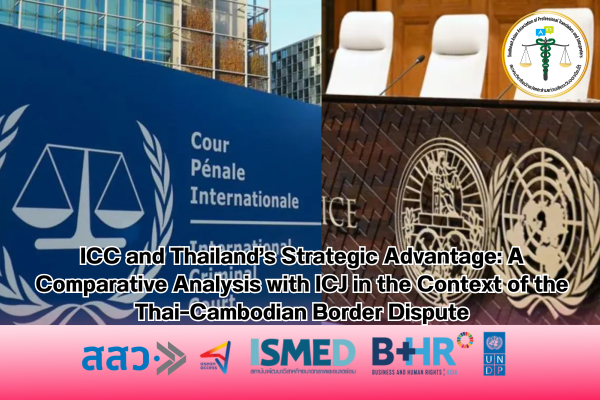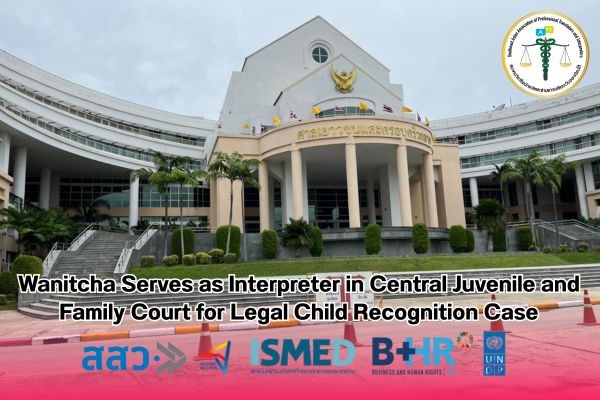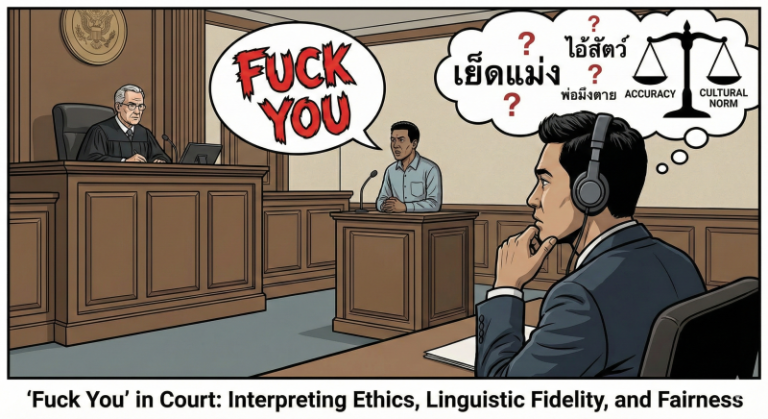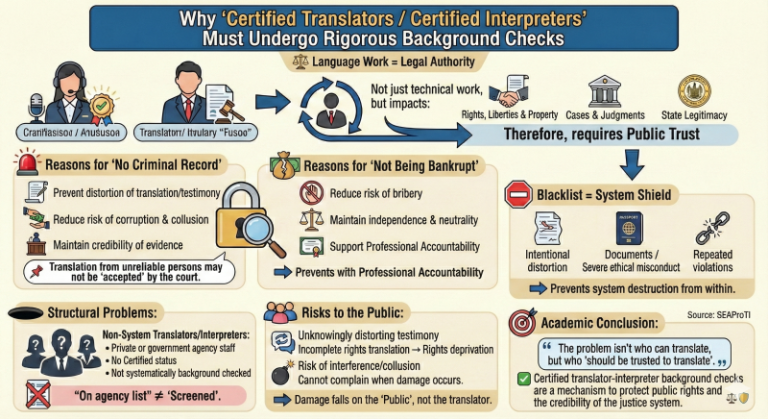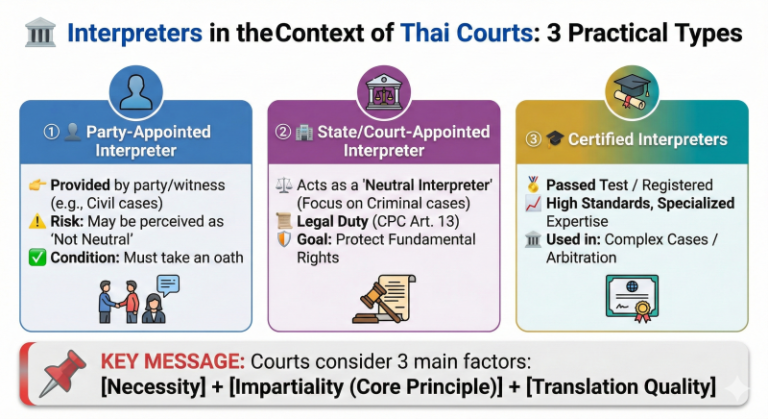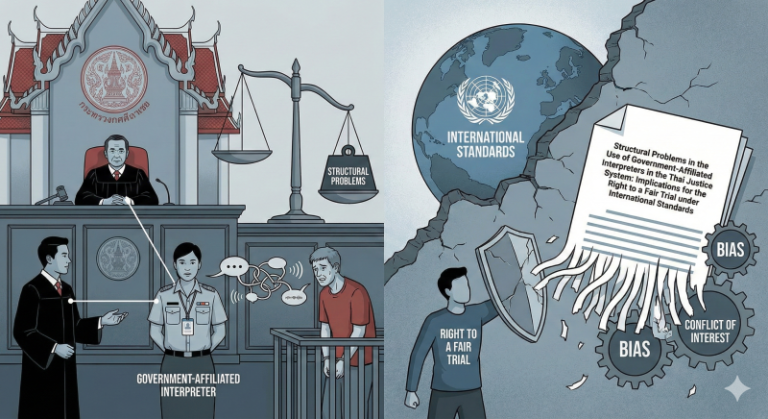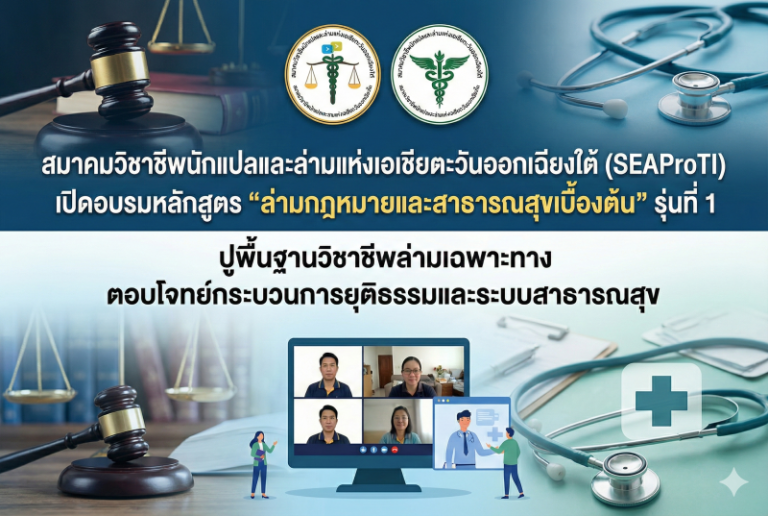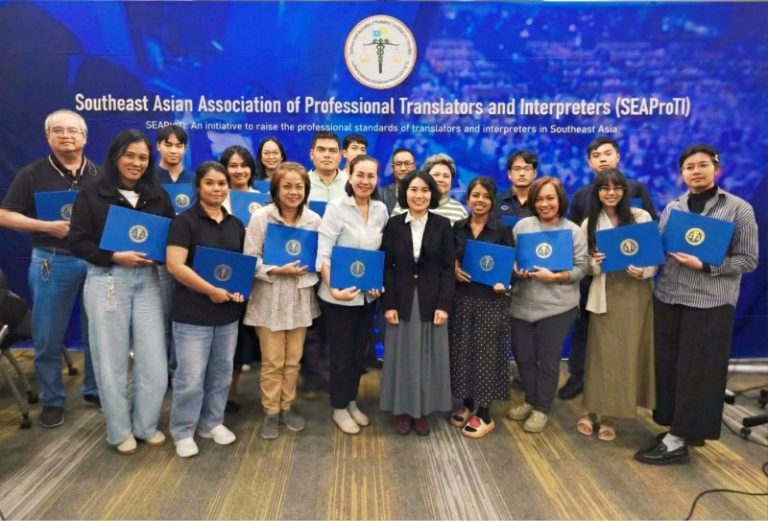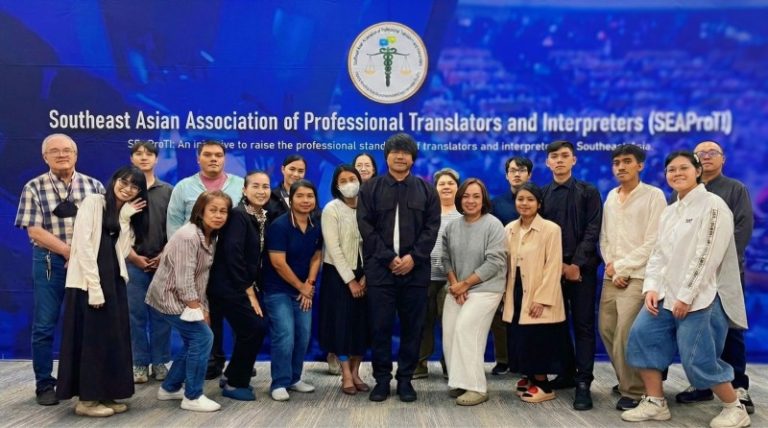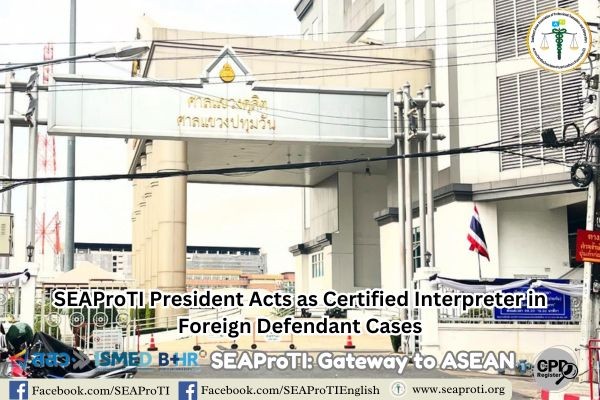The International Criminal Court (ICC) and Thailand’s Strategic Advantage: A Comparative Analysis with the International Court of Justice (ICJ) in the Context of the Thai–Cambodian Border Dispute
By Wanitcha Sumanat, President of the Southeast Asian Association of Professional Translators and Interpreters (SEAProTI)
25 July 2025, Bangkok – This article examines Thailand’s potential strategic advantage in international law if it chooses to pursue proceedings through the International Criminal Court (ICC) instead of the International Court of Justice (ICJ) in response to renewed border tensions with Cambodia. It outlines the structural differences between the two courts and argues that ICC mechanisms may offer Thailand more favorable outcomes, particularly in the context of war crimes and violations of international humanitarian law. The article also draws from previous legal precedents and proposes a forward-looking legal strategy for Thai foreign policy and national defense.
1. Introduction
Tensions along the Thai–Cambodian border, especially in areas near heritage sites such as Preah Vihear and Ta Muen Thom temples, have long challenged both legal and diplomatic channels. Historically, Thailand has turned to the International Court of Justice (ICJ) to resolve such disputes, often facing unfavorable outcomes. However, in a situation where allegations concern military aggression against civilians or violations of international humanitarian law, the International Criminal Court (ICC) may serve as a more strategically advantageous venue for Thailand to seek justice and international support.
2. Structural and Jurisdictional Differences between ICJ and ICC
| Feature | International Court of Justice (ICJ) | International Criminal Court (ICC) |
|---|---|---|
| Jurisdiction | Inter-state legal disputes | Prosecution of individuals |
| Case Types | Territorial disputes, treaty law | War crimes, genocide, crimes against humanity |
| Defendants | States | Individuals (e.g., military or political leaders) |
| Governing Instruments | United Nations Charter | Rome Statute |
| Location | The Hague, Netherlands | The Hague, Netherlands |
(ICJ, 2024; ICC, 2023)
The ICJ focuses on disputes between states, especially regarding treaties and boundaries, while the ICC prosecutes individuals for serious violations of international criminal law (Scharf, 2011).
3. Why Thailand Could Benefit Strategically from Turning to the ICC
3.1 Individual, Not State, Responsibility
The ICC prosecutes individuals rather than states. If Cambodian military or government officials are implicated in unlawful attacks on civilians, religious sites, or hospitals, Thailand could shift the focus of responsibility away from the state and toward specific actors.
3.2 Jurisdiction Over Humanitarian Law Violations
If there is credible evidence that Cambodian forces deliberately targeted non-military objectives, such actions may constitute war crimes under Article 8 of the Rome Statute, placing them under the ICC’s jurisdiction (Rome Statute, 1998).
3.3 ICC Can Act Even Without Thai Ratification
Though Thailand is not a State Party to the Rome Statute, the United Nations Security Council (UNSC) can refer situations to the ICC, as it did in the Darfur and Libya cases (UNSC, 2005). Thailand can therefore initiate proceedings indirectly through diplomatic channels.
3.4 Avoiding ICJ’s Territorial Risks
In previous ICJ judgments on Preah Vihear (1962, 2013), Thailand was ordered to withdraw troops and faced reputational and territorial losses. The ICC does not adjudicate territorial disputes, thus allowing Thailand to address war crimes without the risk of ceding land or sovereignty (Thitinan, 2013).
3.5 A Diplomatic and Psychological Tool
If ICC proceedings lead to the issuance of international arrest warrants for Cambodian leaders involved in alleged war crimes, it would significantly diminish their political legitimacy and global standing, thus strengthening Thailand’s position in international diplomacy (Akhavan, 2009).
4. Potential Risks for Thailand
While pursuing ICC action could favor Thailand, the country must ensure strict adherence to international humanitarian law. Any proven violation by Thai forces—such as indiscriminate attacks on civilians—could lead to countersuits or undermine Thailand’s legal claims (Rome Statute, 1998).
5. Policy Recommendations
- The Thai government should collect and preserve credible evidence of humanitarian violations committed by opposing forces.
- The Ministry of Foreign Affairs should develop a strategy for engagement with the ICC via the UNSC.
- Legal training on international criminal law should be expanded among Thai diplomats, military officers, and legal practitioners to prepare for potential proceedings.
6. Conclusion
Turning to the ICC provides Thailand with an alternative legal path to pursue justice without the risks associated with ICJ proceedings, particularly concerning territory and sovereignty. By focusing on individual accountability and violations of international humanitarian law, Thailand can reframe the narrative from territorial dispute to human rights protection. The ICC thus represents not only a legal mechanism but also a powerful strategic and diplomatic tool for Thailand on the global stage.
References
- Akhavan, P. (2009). Are International Criminal Tribunals a Disincentive to Peace? Human Rights Quarterly, 31(3), 624–654. https://doi.org/10.1353/hrq.0.0094
- International Court of Justice (ICJ). (1962). Case Concerning the Temple of Preah Vihear (Cambodia v. Thailand). https://www.icj-cij.org/en/case/45
- International Court of Justice (ICJ). (2013). Request for Interpretation of the Judgment of 15 June 1962. https://www.icj-cij.org/en/case/151
- International Criminal Court (ICC). (2023). Understanding the ICC. The Hague: ICC. https://www.icc-cpi.int
- Rome Statute of the International Criminal Court. (1998). UN Doc. A/CONF.183/9.
- Scharf, M. P. (2011). The ICC’s Jurisdiction over Nationals of Non-Party States: A Critique of the U.S. Position. Law and Contemporary Problems, 64(1), 67–117.
- Thitinan Pongsudhirak. (2013). The Preah Vihear Debacle and Thai Foreign Policy. Bangkok Post. https://www.bangkokpost.com
- United Nations Security Council (UNSC). (2005). Resolution 1593 (2005) on Darfur. S/RES/1593 (2005).
SEAProTI’s certified translators, translation certification providers, and certified interpreters:
The Southeast Asian Association of Professional Translators and Interpreters (SEAProTI) has officially announced the criteria and qualifications for individuals to register as “Certified Translators,” “Translation Certification Providers,” and “Certified Interpreters” under the association’s regulations. These guidelines are detailed in Sections 9 and 10 of the Royal Thai Government Gazette, issued by the Secretariat of the Cabinet under the Office of the Prime Minister of the Kingdom of Thailand, dated July 25, 2024, Volume 141, Part 66 Ng, Page 100. The Royal Thai Government Gazette
ศาลอาญาระหว่างประเทศ (ICC) กับความได้เปรียบเชิงยุทธศาสตร์ของประเทศไทย:
การวิเคราะห์เปรียบเทียบกับศาลยุติธรรมระหว่างประเทศ (ICJ) ในกรณีข้อพิพาทบริเวณชายแดนไทย–กัมพูชา
โดย วณิชชา สุมานัส นายกสมาคมวิชาชีพนักแปลและล่ามแห่งเอเชียตะวันออกเฉียงใต้
25 กรกฎาคม 2568, กรุงเทพมหานคร – บทความนี้วิเคราะห์กลยุทธ์ทางกฎหมายระหว่างประเทศของประเทศไทยในบริบทของความขัดแย้งบริเวณชายแดนกับประเทศกัมพูชา โดยเปรียบเทียบข้อได้เปรียบและความเสี่ยงระหว่างการใช้กลไกของศาลยุติธรรมระหว่างประเทศ (ICJ) กับศาลอาญาระหว่างประเทศ (ICC) จุดเน้นอยู่ที่ข้อเสนอว่าทำไมประเทศไทยจึงอาจเลือกใช้ ICC เป็นกลไกเชิงยุทธศาสตร์เพื่อเรียกร้องความยุติธรรมจากอาชญากรรมสงคราม และหลีกเลี่ยงข้อเสียหายเชิงพื้นที่และอธิปไตยที่เคยเกิดขึ้นในกระบวนการ ICJ
1. บทนำ
ความขัดแย้งชายแดนระหว่างประเทศไทยและประเทศกัมพูชา โดยเฉพาะบริเวณใกล้เขตโบราณสถาน เช่น ปราสาทพระวิหารและปราสาทตาเมือนธม ได้เป็นประเด็นที่ท้าทายทั้งด้านกฎหมายและการทูตมายาวนาน แม้ว่าในอดีตคดีเกี่ยวกับพื้นที่พิพาทได้ถูกนำขึ้นพิจารณาในศาลยุติธรรมระหว่างประเทศ (International Court of Justice: ICJ) แต่ในบริบทที่มีข้อกล่าวหาเกี่ยวกับการใช้อาวุธต่อเป้าหมายพลเรือนและละเมิดกฎหมายมนุษยธรรมระหว่างประเทศ บทบาทของศาลอาญาระหว่างประเทศ (International Criminal Court: ICC) อาจเป็นกลไกที่ให้ความได้เปรียบเชิงยุทธศาสตร์แก่ประเทศไทย
2. ความแตกต่างเชิงโครงสร้างและอำนาจศาลระหว่าง ICJ และ ICC
| หัวข้อ | ศาลยุติธรรมระหว่างประเทศ (ICJ) | ศาลอาญาระหว่างประเทศ (ICC) |
|---|---|---|
| เขตอำนาจ | พิจารณาข้อพิพาทระหว่างรัฐ | ดำเนินคดีอาญากับบุคคล |
| ประเภทคดี | คดีอาณาเขต สนธิสัญญา | อาชญากรรมสงคราม, ฆ่าล้างเผ่าพันธุ์ |
| จำเลย | รัฐ | บุคคล (เช่น ผู้นำทหาร/การเมือง) |
| องค์กรที่เกี่ยวข้อง | สหประชาชาติ (UN) | ธรรมนูญกรุงโรม (Rome Statute) |
| สถานที่ตั้ง | กรุงเฮก, เนเธอร์แลนด์ | กรุงเฮก, เนเธอร์แลนด์ |
(ICJ, 2024; ICC, 2023)
ICJ มุ่งเน้นการแก้ไขข้อพิพาททางกฎหมาย เช่น การตีความสนธิสัญญาหรือเส้นเขตแดน ขณะที่ ICC มุ่งเน้นความผิดที่เป็น อาชญากรรมระหว่างประเทศต่อมนุษยชาติ โดยเฉพาะอย่างยิ่งในบริบทสงคราม (Scharf, 2011)
3. เหตุใดประเทศไทยจึงได้เปรียบหากใช้กลไกของ ICC
3.1 เน้นการดำเนินคดีต่อ “บุคคล” แทน “รัฐ”
หนึ่งในข้อได้เปรียบสำคัญของ ICC คือ การพิจารณาเจาะจงต่อบุคคลผู้กระทำผิด เช่น ผู้บัญชาการทหารหรือผู้นำทางการเมือง โดยไม่กล่าวโทษรัฐทั้งประเทศ นี่จึงเป็นการ “แยกความผิดออกจากรัฐ” ซึ่งเหมาะสมกับยุทธศาสตร์ของไทยที่ต้องการรักษาภาพลักษณ์ของรัฐในเวทีโลก
3.2 เน้นการละเมิดสิทธิมนุษยชนและกฎหมายมนุษยธรรม
หากฝ่ายตรงข้ามโจมตีพลเรือน โรงพยาบาล หรือวัด ซึ่งเป็นเป้าหมายที่ไม่ได้มีลักษณะทางทหาร ย่อมเข้าข่ายอาชญากรรมสงครามภายใต้เขตอำนาจศาล ICC ตามมาตรา 8 ของ Rome Statute (Rome Statute, 1998)
3.3 ไทยสามารถใช้ ICC แม้ไม่เป็นรัฐภาคี
แม้ประเทศไทยยังไม่ให้สัตยาบันต่อธรรมนูญกรุงโรม แต่ คณะมนตรีความมั่นคงแห่งสหประชาชาติ (UNSC) มีอำนาจส่งคดีเข้าสู่ ICC ได้ เช่นเดียวกับกรณีดาร์ฟูร์ (UNSC, 2005)
3.4 หลีกเลี่ยงประวัติศาสตร์การสูญเสียใน ICJ
การที่ ICJ เคยมีคำพิพากษาให้ไทยถอนกำลังจากพื้นที่ใกล้ปราสาทพระวิหารในปี 1962 และย้ำในปี 2013 เป็นบทเรียนทางการเมืองที่ไทยไม่อาจมองข้าม การไป ICC ซึ่งไม่ตัดสินเขตแดน จึงช่วยลดความเสี่ยงทางยุทธศาสตร์และภูมิรัฐศาสตร์ได้ (Thitinan, 2013)
3.5 ใช้เป็นกลไกกดดันทางการทูตและจิตวิทยา
หาก ICC ออกหมายจับผู้นำฝ่ายตรงข้ามในข้อหาอาชญากรรมสงคราม จะส่งผลเชิงลบต่อความชอบธรรมและภาพลักษณ์ในเวทีระหว่างประเทศ ซึ่งเป็นเครื่องมือกดดันทางการทูตอย่างมีประสิทธิภาพ (Akhavan, 2009)
4. ความเสี่ยงที่ไทยต้องระวัง
แม้กลไก ICC จะเปิดโอกาสให้ไทยสามารถโจมตีฝ่ายตรงข้ามในเชิงกฎหมายได้ แต่ไทยเองก็ต้องระมัดระวังในการใช้กำลังอย่างมีความชอบธรรม หากมีการกระทำผิด เช่น โจมตีเป้าหมายที่ไม่มีลักษณะทางทหาร ก็อาจตกเป็นฝ่ายถูกดำเนินคดีกลับได้เช่นกัน (Rome Statute, 1998)
5. ข้อเสนอเชิงนโยบาย
- ไทยควรจัดเก็บพยานหลักฐานเกี่ยวกับการละเมิดกฎหมายมนุษยธรรมให้เป็นระบบ
- กระทรวงการต่างประเทศควรพัฒนาแนวทางเชิงยุทธศาสตร์ในการใช้กลไก ICC ร่วมกับ UNSC
- ส่งเสริมความรู้ด้านกฎหมายอาญาระหว่างประเทศในหมู่นักการทูต ทหาร และนักกฎหมาย เพื่อเตรียมพร้อมหากมีการยกระดับข้อพิพาทเข้าสู่ศาลสากล
6. สรุป
ICC เปิดโอกาสให้ประเทศไทยสามารถดำเนินกลยุทธ์เชิงรุกโดยไม่เสี่ยงต่อการสูญเสียเขตแดนหรืออธิปไตย ด้วยการดำเนินคดีต่อผู้นำฝ่ายตรงข้ามที่ละเมิดกฎหมายมนุษยธรรม การใช้ ICC จึงไม่เพียงแต่เป็นกลไกด้านกฎหมาย หากยังเป็น เครื่องมือทางการทูตและยุทธศาสตร์ ที่ทรงพลังในเวทีระหว่างประเทศ
เอกสารอ้างอิง (References)
- Akhavan, P. (2009). Are International Criminal Tribunals a Disincentive to Peace? Human Rights Quarterly, 31(3), 624–654. https://doi.org/10.1353/hrq.0.0094
- International Court of Justice (ICJ). (1962). Case Concerning the Temple of Preah Vihear (Cambodia v. Thailand). https://www.icj-cij.org/en/case/45
- International Court of Justice (ICJ). (2013). Request for Interpretation of the Judgment of 15 June 1962. https://www.icj-cij.org/en/case/151
- International Criminal Court (ICC). (2023). Understanding the ICC. The Hague: ICC. https://www.icc-cpi.int
- Rome Statute of the International Criminal Court. (1998). UN Doc. A/CONF.183/9.
- Scharf, M. P. (2011). The ICC’s Jurisdiction over Nationals of Non-Party States: A Critique of the U.S. Position. Law and Contemporary Problems, 64(1), 67–117.
- Thitinan Pongsudhirak. (2013). The Preah Vihear Debacle and Thai Foreign Policy. Bangkok Post. https://www.bangkokpost.com
- United Nations Security Council (UNSC). (2005). Resolution 1593 (2005) on Darfur. S/RES/1593 (2005).
เกี่ยวกับนักแปลรับรอง ผู้รับรองการแปล และล่ามรับรองของสมาคมวิชาชีพนักแปลและล่ามแห่งเอเชียตะวันออกเฉียงใต้
สมาคมวิชาชีพนักแปลและล่ามแห่งเอเชียตะวันออกเฉียงใต้ (SEAProTI) ได้ประกาศหลักเกณฑ์และคุณสมบัติผู้ที่ขึ้นทะเบียนเป็น “นักแปลรับรอง (Certified Translators) และผู้รับรองการแปล (Translation Certification Providers) และล่ามรับรอง (Certified Interpreters)” ของสมาคม หมวดที่ 9 และหมวดที่ 10 ในราชกิจจานุเบกษา ของสำนักเลขาธิการคณะรัฐมนตรี ในสำนักนายกรัฐมนตรี แห่งราชอาณาจักรไทย ลงวันที่ 25 ก.ค. 2567 เล่มที่ 141 ตอนที่ 66 ง หน้า 100 อ่านฉบับเต็มได้ที่: นักแปลรับรอง ผู้รับรองการแปล และล่ามรับรอง


